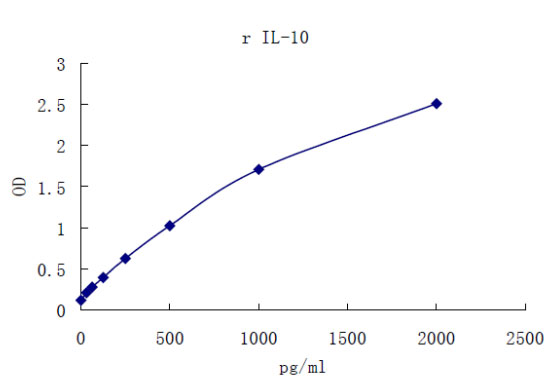Product Detail
Product NameRat IL-10 ELISA kit
ApplicationsELISA
Species ReactivityRt
SpecificityNatural and recombinant Rat IL-10 Ligand
Target NameRat IL-10
Application Details
Detect Range: 0.03 - 2.0 ng/mL
Sensitivity: 15pg/mL
Sample Type: Cell culture supernatant, serum, plasma (EDTA, citrate, heparin)
Sample Volume: 20 uL
Assay Time: 3 hour
Detection method: Colorimetric
Interleukin 10 (IL-10), initially designated cytokine synthesis inhibitor, is a pleiotropic cytokine that inhibits the production of a number of cytokines (including IL-1, GM-CSF, TNF, IL-6, IL-8, IL-12 and IFN-γ) by activated Th1 cells, NK cells, and monocytes/macrophages(1-5).
Rat IL-10 cDNA encodes a 178 amino acid (aa) residue precursor protein that contains an 18 aa signal sequence and a 160 aa mature protein (1, 2). Within the mature protein, there are two potential N-linked glycosylation sites and five cysteine residues. Mature rat IL-10 shares 85% and 74% aa sequence identity with mouse and human IL-10, respectively (1, 4). Although rat and human IL-10 are both active on mouse cells, mouse IL-10 is not active on human cells (4).
Based on human and mouse studies, biologically active rat IL-10 is likely to be a nondisulfide-linked homodimer in solution (4). Although IL-10 is considered to be a strictly secreted cytokine, the existence of biologically-active, membrane-bound IL-10 has also been reported. IL-10 has been shown to inhibit macrophage cytotoxic activity and to stimulate the proliferation and differentiation of B cells, mast cells, and thymic T cells. IL-10 is a potent modulator of monocyte/macrophage function. IL-10 also enhances the release of soluble TNF receptors and inhibits the expression of surface ICAM-1 and B7 (6, 7).
Finally, IL-10 has been reported to suppress the synthesis of superoxide anion (8) plus reactive oxygen intermediates (ROI), and either inhibit or facilitate nitric oxide synthesis, depending on the time of exposure to activated macrophages (9). IL-10 has marked effects on B cells. IL-10 also has documented activity on endothelial cells, where it mimics IL-4 (10), and on thymocytes (11) and mast cells, where it acts as a growth costimulator (12, 13).
If you have published an article using product EK0520, please notify us so that we can cite your literature.
et al,Myricetin suppresses traumatic brain injury-induced inflammatory response via EGFR/AKT/STAT pathway
, (2023),
PMID:
38123650
et al,Multifunctional manganese-based nanogels catalyze immune energy metabolism to promote bone repair
, (2025),
PMID:
et al,Biomimetic mineralized DCPA/ anti-CD47 containing thermo-sensitive injectable hydrogel for bone-metastatic prostate cancer treatment.
, (2025),
PMID:
40051525
et al,Nature-derived microneedles with metal-polyphenolic networks encapsulation for chronic soft tissue defects repair: Responding and remodeling the regenerative microenvironment.
, (2025),
PMID:
40026624



 YES
YES



